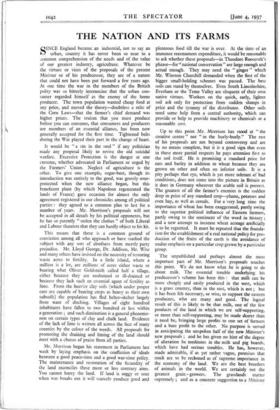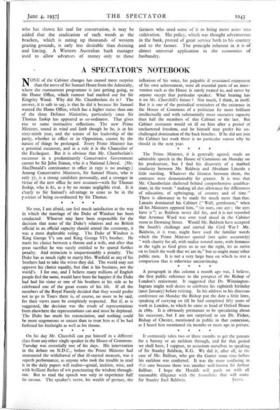THE NATION AND ITS FARMS
SINCE England became an industrial, not to say an urban, country it has never been so near to a common comprehension of the needs and of the value of our greatest industry, agriculture. Whatever be the virtues or vices of the proposals of the present Minister or of his predecessor, they are of a nature that could not have been put forward a few years ago. At one time the war in the members of the British polity was so bitterly internecine that the urban con- sumer regarded himself as the enemy of the home producer. The town population wanted cheap food at any price, and nursed the theory—doubtless a relic of the Corn Laws—that the farmer's chief demand was higher prices. The truism that you must produce before you can consume, that consumers and producers are members of an essential alliance, has been now generally accepted for the first time. Tightened belts during the War played their part in the change of heart.
It would be " a sin in the soul " if any politician made any proposal likely to revive the old suicidal warfare. Excessive Protection is the danger at one extreme, whether advocated in Parliament or urged by the Farmers' Union. Neglect of agriculture is the other. To give one example, sugar-beet, though its introduction was entirely to the good, was grossly over- protected when the new alliance began, but this beneficent plant (by which Napoleon regenerated the lands of France) gave occasion for almost the only agreement registered in our chronicles among all political parties : they agreed to a common plan to last for a number of years. Mr. Morrison's proposals will not be accepted in all details by his political opponents, but he has so patently " stolen the clothes " of both Liberal and Labour theorists that they can hardly object to his kit.
This means that there is a common ground of conviction among all who approach or have studied the subject with any sort of aloofness from merely party prejudice. Mr. Lloyd George, Dr. Addison, Mr. Wise and many others have insisted on the necessity of restoring waste acres to fertility. In a little island, where a million is a lot, are millions of acres either waste or bearing what Oliver Goldsmith called half a tillage, either because they are undrained or ill-drained or because they lack such an essential agent of fertility as lime. From the heavier clay soils (which under proper care are capable of bearing crops as heavy as their own subsoils) the population has fled helter-skelter largely from want of ditching. Villages of eight hundred inhabitants have fallen to two hundred or less within a generation ; and such diminution is a general phenome- non on certain types of clay and chalk land. Evidence of the lack of lime is written all across the face of many counties by the colour of the weeds. All proposals for promoting the draining and liming of the land should meet with a chorus of praise from all parties.
Mr. Morrison began his statement in Parliament last week by laying emphasis on the confliction of ideals between a good peace-time and a good war-time policy. The maintenance and restoration of the fecundity of the land reconciles these more or less contrary aims You cannot hurry the land. If land is soggy or sour when war breaks out it will scarcely produce good and plenteous food till the war is over. At the time of an immense rearmament expenditure, it would be reasonable to ask whether these proposals—in Theodore Roosevelt's phrase—for "national conservation" are large enough and actual enough. They may need the " ginger " which Mr. Winston Churchill demanded when the first of the bigger small-holding schemes was passed. The best soils can stand by themselves. Even South Lincolnshire, Evesham or the Teme Valley are eloquent of their own native virtues. Workers on the quick, early, lighter soil ask only for protection from sudden slumps in price and the tyranny of the distributor. Other soils need some help from a central authority, which can provide or help to provide machinery or chemicals at a reasonable cost.
Up to this point Mr. Morrison has stood at " the creative centre " not " in the hurly-burly." The rest of his proposals are not beyond controversy and are by no means complete, but it is a good sign that even in these more partial respects he pays attention first to the soil itself. He is promising a standard price for oats and barley in addition to wheat because they are grown on other and often on inferior soils. It is a pity perhaps that rye, which is yet more tolerant of bad conditions, does not come into the picture in Britain as it does in Germany wherever the arable soil is poorest. The greatest of all the farmer's enemies is the sudden drop in price of any standard crop—plums, potatoes and even hay, as well as cereals. For a very long time the importance of wheat has been exaggerated, partly owing to the superior political influence of Eastern farmers, partly owing to the sentiment of the word in history ; and a new attempt to increase wheat acreage artificially is to be regretted. It must be repeated that the founda- tion for the establishment of a real national policy for pro- duction of the fruits of the earth is the avoidance of undue emphasis on a particular crop grown by a particular group.
The unpublished and perhaps almost the most important part of Mr. Morrison's proposals touches this point. We do not know what he is going to do about milk. The essential trouble underlying his predecessor's scheme has been this : that milk can be more cheaply and easily produced in the west, which is a grass country, than in the east, which is not ; but it has been felt necessary, or wise, to support the eastern producers, who are many and good. The logical result of this is likely to be that milk, one of the few products of the land in which we are self-supporting, or more than self-supporting, may be made dearer than it need be, bringing large profits to one set of farmers and a bare profit to the other. No purpose is served in anticipating the unspoken half of the new Minister's new proposals ; and he has given no hint of the degree of alteration he meditates in the milk and pig boards, which have had serious troubles. He has, however, made admirable, if as yet rather vague, promises that stock are to be reckoned as of supreme importance in the economy of the land.. We are the best breeders of animals in the world. We are certainly not the greatest grain - growers. The grasslands matter supremely ; and as a concrete suggestion to a Minister who has shown his zeal for conservation, it may be added that the eradication of such weeds as the bracken, which is eating up thousands of western grazing grounds, is only less desirable than draining and liming. A Western Australian bank manager used to allow advances of money only to those farmers who used some of it to bring more acres into cultivation. His policy, which was thought adventurous in the bank, proved of great service both to his country and to the farmer. The principle inherent in it is of almost universal application in the economics of husbandry.











































 Previous page
Previous page